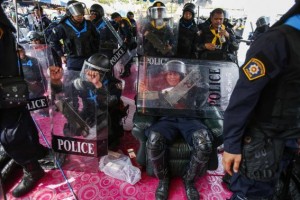 (Reuters) – Protesters seeking to oust Thai Prime Minister Yingluck Shinawatra plan to rally at her temporary office on Wednesday, creating another potential flashpoint a day after five people were killed in gun battles in Bangkok.
(Reuters) – Protesters seeking to oust Thai Prime Minister Yingluck Shinawatra plan to rally at her temporary office on Wednesday, creating another potential flashpoint a day after five people were killed in gun battles in Bangkok.
A security official said police would not attempt to retake more protest sites and would focus on protecting Yingluck, whose problems are mounting after an anti-corruption agency filed charges against her over a soured rice subsidy scheme.
The protests are the latest installment of an eight-year political battle broadly pitting the Bangkok middle class and royalist establishment against the mostly rural supporters of Yingluck and her brother, former premier Thaksin Shinawatra.
Tuesday’s clashes were some of the worst between protesters and security forces since the campaign to unseat Yingluck began in November.
The Erawan Medical Center, which monitors Bangkok hospitals, said on Wednesday one police officer and four protesters had been killed and 65 wounded. The death toll had earlier been put at four.
Violence flared as police made their most determined effort since the start of the protests to reclaim sites around government buildings that have been occupied for weeks.
National Security Council Chief Paradorn Pattanathabutr told Reuters on Wednesday there would probably be a pause while security forces assess their options. “We don’t expect to reclaim any protest sites further,” he said.
Yingluck, seen by opponents as a proxy for her self-exiled brother Thaksin, has been working from a defense ministry compound in north Bangkok since the protests forced her to vacate her Government House office in January.
Protest leader Suthep Thaugsuban told supporters at a Tuesday evening rally in Bangkok’s central business district that protesters would march on the temporary HQ on Wednesday.
“No matter where Yingluck is, we will follow,” he said.
National security chief Paradorn said police would mount “a mission to secure this place as the first priority”.
GROWING PARALYSIS
Thai politics has been gripped by growing paralysis since Yingluck called a snap election in December.
Disruption by protesters meant voting could not be completed in the February 2 poll, leaving Yingluck at the head of an enfeebled caretaker administration amid uncertainty over when a new government can be installed.
Demonstrators accuse Yingluck’s billionaire brother Thaksin of nepotism and corruption and say he used taxpayers’ money for populist subsidies and easy loans that have bought him the loyalty of millions in the populous north and northeast.
The protesters, who are still blocking major intersections in central Bangkok, want to suspend what they say is a fragile democracy under Thaksin’s control and eradicate his influence by altering electoral arrangements.
Adding to the crisis, a flagship rice program that paid farmers way above the market rate has proved ruinously expensive, fuelling middle-class anger, and the caretaker government lacks the power to keep funding it.
A state bank had to cancel a loan that might have helped prop up the scheme in the face of a revolt by depositors who began pulling their money out.
Thailand’s anti-corruption body began an investigation last month and said on Tuesday it was filing charges against Yingluck. She was summoned to hear the charges on February 27.








